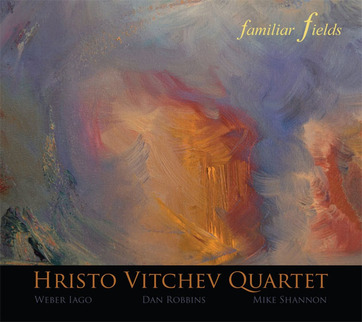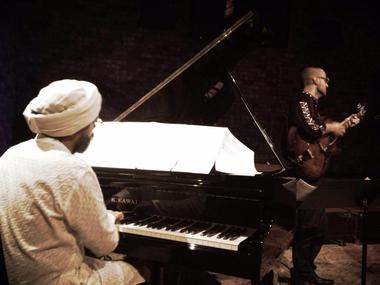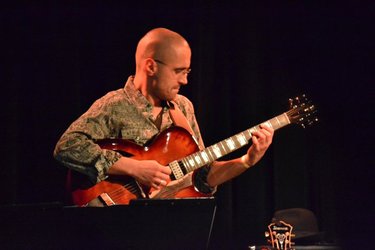
Part of the reason for that has to be credited to Hristo’s choice of musicians in the quartet. The musical affinity and effortless grace shines forth on this album like few recordings I have ever heard. They share a single heart and mind that bursts forth in illumination on every track. There is no weak moment or weak player on this album.
That musical kinship is expressed by bassist Dan Robbins in his words “This has been the most effortless recording I have done; the band chemistry is so in tune with one another that many of the songs were first and only takes… It is pure expression and the essence of music.”
Hristo Vitchev himself explains the evolution of the music as originating in material written between his second and third albums but not yet ready for recording. Then when Mike Shannon joined the quartet on drums, Hristo felt that it was time to revisit the material. As they played the songs of this—his fifth—album, it was as if he was “walking through Familiar Fields yet everything I saw along the way I saw for the first time.”
This explains the lyricism and poetry of this wonderful album.
Dan Robbin’s bass solo adds to the flow and creates a splendid platform from which Hristo jumps into his own solo following which Weber Iago spins away his solo piano. Iago is to Vitchev what Lyle Mays is to Pat Metheny, forming the perfect tonal base for Hristo’s sonic adventures.
The following track is “Wounded by a Poisoned Arrow” another original Vitchev composition, as indeed are all the songs on this recording. Despite the foreboding of the title, the piece itself is uplifting and rejoicing.

Hristo Vitchek is from Sofia, Bulgaria but now makes his home in the San Francisco Bay area. He is a teaching musician and has taught guitar clinics from Europe to Japan and points between. In his book “Between the Voicings: A New Approach to Chord Building for Guitarists” Hristo gives the secrets to his expanded voicings by moving away from the traditional “drop 2 and drop 2 and 4” approach. This album is proof of his principles.
Far and away the most delightful track for me is “The Prophet’s Daughter” with its evocative imagery created from corps progressions and rolling-thunder percussion. The drum opening with its combined ride and kick—played ever so lightly—splendidly heralds the entry of the harmonic guitar. The classical piano and jazz guitar crescendo together and then fall away into the swirling drum work.
The returning piano is locked in with the bass and drum into a thrilling jazz trio until Hristo’s guitar finds a crack in the door to return to a quartet. This is exciting and invigorating stuff! Percussive piano and bass followed by climbing harmonies—astonishing.
Weber Iago was born Weber Ribeiro Drummond in Rio de Janeiro, Brazil. He has spent his musical life moving from classical to jazz with Brazilian music adding to the richness. All of these influences are brought to bear in his contributions on this album.
This is especially true on “They Are No More.” Weber takes the lead at the start and it carries all the influences of his musical life. There is a melancholy here that is sweet and touching. Hristo and Weber play with and against each other in all the most extraordinary ways. This may be Weber’s most brilliant moment.
It is also a great track for Dan Robbins on bass. He has been featured with many West Coast jazz stars and has taught at the Monterey Jazz Festival. His lyrical closing of “They Are No More” is a highlight.
“Familiar Fields, part one and part two” are the fifth and sixth tracks of the album and represent Hristo’s ingenuity as a composer in astounding ways. Standing in the middle of this CD, these two tracks are musically and emotionally the centerpiece of the recording. Hristo is at his virtuosic best here with Weber in strong partnership.

Mike Shannon plays with such innovation and originality that he is truly a transformative member of this quartet. His soft touch is the finest possible compliment to Robbins’ bass choices.
Even with the conclusion of these two magnificent tracks, the beauty and energy and uniqueness do not disappear. On the contrary, the compositions and performance continues to climb. “The Mask of Agamemnon” and “The Fifth Season” mark an on-going ascent that is breath-taking.
“The Mask of Agamemnon” sounds like it could have been composed by George Gershwin in collaboration with Django Reinhardt. It is a modern revisiting of early jazz in its layers and tone.
These comparisons are in no way meant to describe Hristo’s compositions as derivative or unoriginal. Quite the opposite, they are fresh and innovative and incredibly intriguing. None more so than “The Fifth Season” which is the penultimate track on the album. The rhythmic piano couplets in the melody are at once fascinating and emotional. Those couplets fade forward and backward throughout the piece, changing key and moving from forte to pianissimo as the guitar weaves in an out with the piano like a sonic double-helix. This is easily the most riveting composition of the recording.
This wonderful album concludes with a song written for Donka Krasteva, Hristo’s grandmother, and is entitled “Willing to Live.” In the liner notes, Hristo dedicates it to her “endless desire to keep fighting and living.”
The song is sweet and determined. It is the music of life indeed. It is played with love and devotion and it stirs those feelings in the hearer.
The entire album is joyful and life-affirming. It is like a soundtrack of the best day you ever had.
Visit his website at http://www.hristovitchev.com and
First Orbit Sounds Music, Management and Promotion at www.firstorbitsounds.com
Order "Familiar Fields" at http://www.cdbaby.com/cd/hristovitchevquartet

 RSS Feed
RSS Feed
